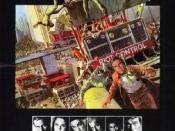In "Genre Transformations and the Failure of Liberalism", by Michael Ryan and Douglas Kellner, films of the seventies can be seen as a sort of barometer for the social and political attitudes of the time. Ryan and Kellner describe the general attitude by saying "Previously respected institutions like government and business were cast in a negative light, and the crisis of confidence gave rise to a confidence of criticism. Indeed, it was what conservatives later would call the spirit of 'self-flagellation,' the liberal and radical critique of American society which culminated in the mid-seventies, that provoked many to turn to a more affirmative and positive vision offered by conservatives in the eighties." With film acting as a form cultural representation, the films of the seventies were bound to show the liberal views of the time by transforming traditional conservative genres. I want to look at two films from the seventies, "Chinatown" (1974), and "Soylent Green" (1973), to see how they fit into this liberal critique as well as how they possibly contributed to the "Failure of Liberalism" that Ryan and Kellner describe.
So what is this "Failure of Liberalism" anyway? If the liberal point of view is infiltrating the film industry so much as to transform traditional genres, how is that a failure? According to Ryan and Kellner, the answer is this; "The Hollywood liberals could debunk the conservative myths of the traditional genre, but by not filling the gap with an alternative vision, they portrayed themselves as a negative force and left the discovery of a positive alternative to the conservatives. One major problem, of course, was that liberals had no alternative vision to offer, and as the mid-seventies ushered in the closest thing to a depression the United States had seen in half a century (the...


